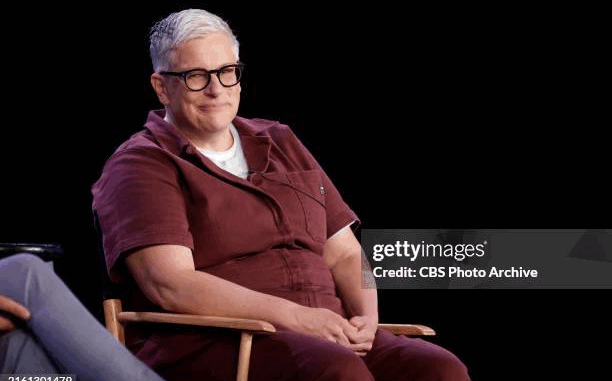
Abby McEnany’s life story isn’t one of red carpets, instant stardom, or traditional Hollywood glamor. Instead, it’s a story rooted in resilience, late-blooming success, and a relentless pursuit of self-understanding. As a queer woman, comedian, and mental health advocate, McEnany has walked a long, unconventional road — one that took her from academic halls and customer service desks to the spotlight of one of TV’s most refreshingly honest shows, Work in Progress.
Early Life: A Traditional Upbringing in a Non-Traditional Soul
Abby McEnany was born in 1968 into a Catholic family and grew up in multiple American cities, including Boston, Providence, and Columbus. Her father was a well-respected heart surgeon, and her upbringing was, in many ways, shaped by conventional structures and expectations. In 1982, her family moved to San Francisco, and four years later, she left home to attend the University of Chicago.
Though she earned a degree from a prestigious institution, McEnany’s heart was never set on a typical professional path. After graduating in 1992, she remained in Chicago and gradually discovered a home in its vibrant comedy and theater scene. The city would become the backdrop for her personal transformation and creative evolution.
Discovering Comedy — and Herself — in Chicago
In the early 1990s, Abby began training at Chicago’s renowned Second City, an improv theater that has launched the careers of comedy legends like Tina Fey, Steve Carell, and Stephen Colbert (who once taught her in class). While others might have seen comedy as a stepping stone to TV or film, for McEnany, it became a life raft — a way to process her own identity and internal chaos through characters and unscripted performance.
At the time, she was also wrestling with undiagnosed and untreated mental health conditions. McEnany would later be diagnosed with obsessive-compulsive disorder (OCD) and depression, but in those early years, her suffering often went unseen and unnamed.
She became a mainstay in the Chicago improv scene, joining all-women comedy troupes like Sirens and performing tirelessly in small venues — all while holding day jobs to pay the bills. She worked for a decade at Morningstar, Inc. in customer service and as a technical writer. Though her professional life was stable, her internal world was often turbulent.
The Long Road to Coming Out

Though she always knew she was different, Abby didn’t fully come out until she was in her 40s — a fact that would surprise many. Growing up in a Catholic household, in a time before LGBTQ+ visibility was common, she struggled with shame and self-acceptance. Even when she began identifying as a lesbian, she was uncertain and sometimes hesitant to embrace the full complexity of her identity.
Everything shifted when she fell in love with a transgender man named Alex. Through that relationship, Abby began to unpack her own queerness more deeply. She realized that gender and sexuality are fluid, and her understanding of herself evolved with it. In interviews, she has shared how that relationship helped her not just love someone else, but love and accept herself.
“I identify as a queer dyke,” she has said bluntly — a phrase that encapsulates her unapologetic authenticity.
Work in Progress: Turning Pain Into Art
By her late 40s, McEnany had spent decades in comedy without major recognition. Then, in 2019, everything changed. Collaborating with filmmaker Tim Mason and the production company behind The Matrix, she developed Work in Progress — a semi-autobiographical series that centers on a 45-year-old queer woman (named Abby) struggling with depression, OCD, and identity in a world that often ignores people like her.
The show was unlike anything else on television. It was awkward, raw, uncomfortable, and incredibly human. Abby didn’t shy away from her real-life struggles — she used them as the foundation for the script. The pilot episode even begins with the character Abby preparing to die by suicide — a fictionalized but emotionally truthful depiction of what McEnany herself had once felt.
Work in Progress ran for two seasons on Showtime and was lauded by critics as one of the most original and fearless shows of its time. It wasn’t just a personal victory for McEnany — it was a cultural moment for queer, middle-aged, mentally ill people who rarely see themselves portrayed honestly on screen.
Advocacy Through Vulnerability
Abby McEnany never set out to be a celebrity. Her success came not from playing a part, but from being radically herself. She has used her platform to speak openly about mental illness, queerness, and the importance of representation. She has dismantled the idea that people must have their lives “figured out” by a certain age, and has shown that success can arrive at any time — even when you’re in your fifties, even when you’re not conventionally “marketable.”
In interviews and public appearances, she continues to be as raw and unfiltered as she is on screen. She speaks candidly about going to therapy, taking medication, and navigating self-hatred and healing. Her honesty has resonated with fans across generations.
Legacy and Ongoing Impact
Though Work in Progress ended in 2021, Abby McEnany’s influence continues. She’s taken on small roles in other television projects, such as And Just Like That… (2023) and Tracker (2024–), but more importantly, she remains a beacon of what it means to live truthfully — even when it’s hard.
Her life story is a powerful reminder that it’s never too late to step into your purpose, to find your voice, or to become the version of yourself you were meant to be. Abby McEnany didn’t follow the rules — she rewrote them in her own messy, beautiful, and courageous way.
From private battles to public triumphs, Abby McEnany’s story is not just about survival — it’s about transformation. She has shown us that humor, honesty, and self-acceptance can be the most powerful tools of all.
